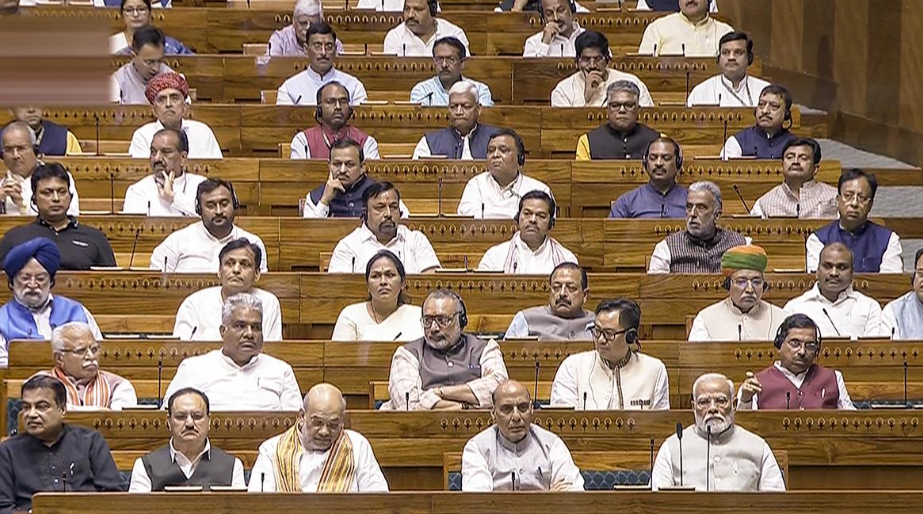Lok Sabha Passes Appropriation Bill for 2024-25 Budget (GS Paper 2, Polity & Governance)

Context
- The Lok Sabha has recently passed the Appropriation (No. 2) Bill, 2024.
- This legislation is a vital component of the budgetary process, allowing the Central Government to access and use funds from the Consolidated Fund of India for the financial year 2024-25.
About Appropriation (No. 2) Bill, 2024
- Purpose: The Appropriation (No. 2) Bill, 2024, is designed to authorize the Central Government to draw funds from the Consolidated Fund of India to meet its planned expenditures for the fiscal year 2024-25. This includes funding for various government departments, public welfare schemes, and development projects.
- Significance: The bill is essential for ensuring that the government can function smoothly and effectively, implementing its policies and programs without financial constraints. It provides the legal framework for government spending and resource allocation.
Key Highlights
Introduction and Passage:
- Introduced by Finance Minister: The bill was introduced by the Finance Minister in the Lok Sabha, following the presentation of the budget.
- Voice Vote: The bill was passed by a voice vote, which means there was no recorded division, and the bill was approved by the majority of members present.
- Guillotine Process: Speaker Om Birla used the guillotine process to expedite the passage of financial matters. This involved grouping several budget discussions together to streamline the legislative process, ensuring that the Appropriation Bill could be considered and passed promptly.
Financial Provisions:
Allocations to Ministries:
- Ministry of Defence: Allocations for defense operations, modernization of armed forces, and national security.
- Ministry of Agriculture: Funds for agricultural development, subsidies, and support for farmers.
- Ministry of Health and Family Welfare: Investments in healthcare infrastructure, medical services, and family welfare programs.
Public Welfare Schemes:
- Pradhan Mantri Matsya Sampada Yojana: A scheme aimed at enhancing the fisheries sector by improving production, infrastructure, and livelihoods in the fisheries community.
- Health and Education Initiatives: Funding for various programs aimed at improving health services, education facilities, and overall quality of life for citizens.
Importance
- Commitment to Services and Development: The bill demonstrates the government's commitment to maintaining and improving essential services and development projects. It ensures that the necessary funds are available to support various initiatives that benefit the public.
- Equitable Resource Distribution: The bill reflects the government’s focus on balanced and equitable distribution of resources across states. For example:
- West Bengal: Allocations for development projects and social schemes in the state.
- Andhra Pradesh: Funding for infrastructure and welfare programs.
- Maharashtra: Investments in state-specific projects and schemes.
- Legislative Role: The Appropriation Bill is a crucial legislative measure that facilitates the government’s planned expenditure for the fiscal year. It ensures that all spending is authorized and accounted for, providing transparency and oversight.
Consolidated Fund of India
- Definition: The Consolidated Fund of India is the primary account from which all government expenditures are drawn. It includes:
- Revenues Received: Taxes, duties, and other income generated by the government.
- Loans Raised: Borrowings by the government for various purposes.
- Receipts from Recoveries: Recoveries from loans previously granted by the government.
- Authorization Requirement: No amount can be withdrawn from the Consolidated Fund without parliamentary approval. This requirement ensures that government spending is subject to legislative oversight and scrutiny.
Guillotine
- Definition: In legislative terminology, a guillotine refers to the practice of expediting the passage of financial business by grouping multiple items together. This is a common procedure in the Lok Sabha during the Budget Session to manage the extensive financial matters efficiently.
- Purpose: The guillotine process helps in managing time and streamlining discussions, ensuring that the legislative process remains orderly and timely, especially when dealing with complex and voluminous budgetary details.
Conclusion
- The passage of the Appropriation (No. 2) Bill, 2024, is a critical step in the budgetary process, authorizing the Central Government to draw funds from the Consolidated Fund of India for the financial year 2024-25.
- This bill supports the continued operation of government departments, public welfare schemes, and development projects, reflecting the government's commitment to effective governance and equitable resource distribution.
- The use of the guillotine process to expedite the passage of the bill highlights the need for efficiency in handling legislative financial matters.


